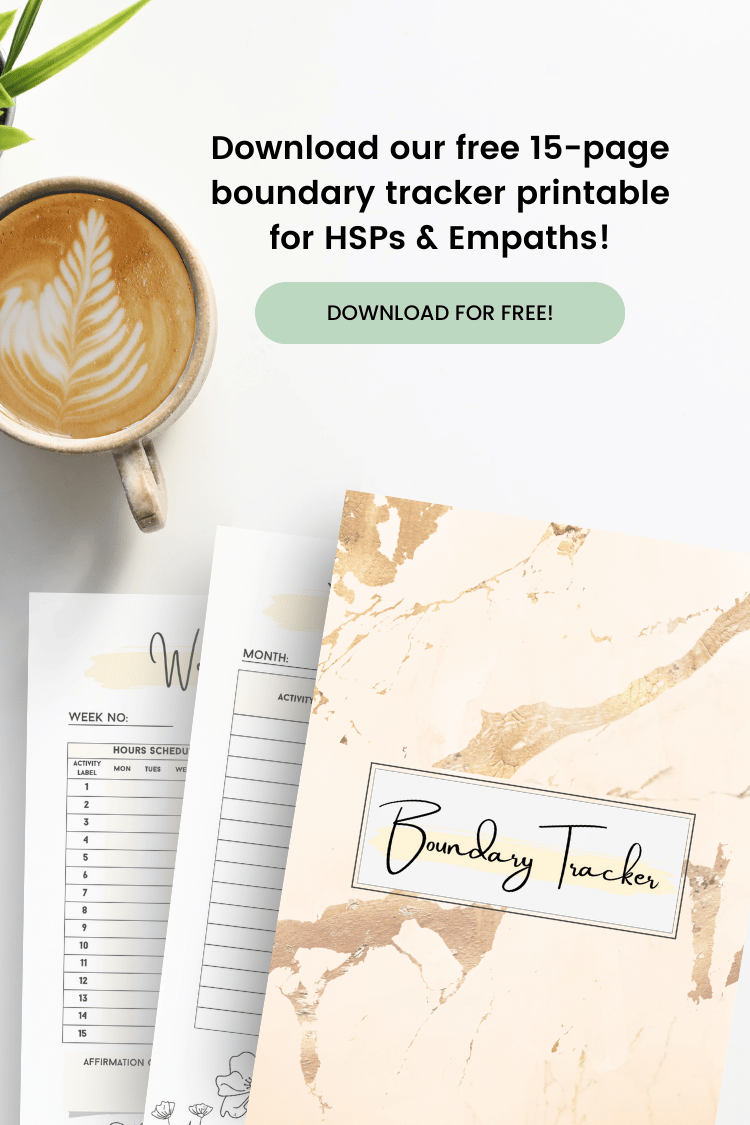Are you an empath and currently in an abusive relationship? In this article, we share practical tips on how to get out of an abusive relationship.
Hey there, lovely readers! We want to be completely transparent with you. Some of the links in this blog are affiliate links, which means if you click on them and make a purchase, we may earn a small commission at no additional cost to you. 😊
We only recommend products and services we genuinely believe in and have personally used or researched. Your support through these links helps us keep bringing you valuable content, so thank you for being amazing!
Estimated reading time: 11 minutes
In the intricate dance of human relationships, empaths move to a rhythm that is profoundly their own. With hearts wide open and senses finely tuned, they navigate the world with a deep capacity for empathy and understanding. Yet, this very gift that allows them to connect so deeply with others can also leave them vulnerable in relationships that veer into the realm of abuse.
Recognizing the signs of abuse and finding the strength to step away from it poses unique challenges for empaths. They may feel bound by their empathy and struggle to protect their own emotional well-being.
This guide seeks to illuminate the path out of abusive relationships, offering clarity, support, and actionable steps for those whose sensitivity is both their greatest gift and their greatest challenge. Here, we will explore the types of abuse, identify common indicators of an abusive relationship, and provide a step-by-step plan to safely navigate away from harm.
For empaths caught in the storm of an abusive relationship, know this: your sensitivity is a strength. With the right support and knowledge, you can reclaim your power and embark on a journey to healing and self-discovery.
Here’s What You’ll Discover:
Understanding Empathy in Relationships
For empaths, the depth of feeling isn’t just a trait; it’s a way of life. Empaths possess an innate ability to tune into the emotions of those around them. Moreover, they feel what others feel as if those emotions were their own. This heightened sensitivity can foster deep connections and understanding, making empaths invaluable friends, partners, and community members. However, in the context of a relationship, this same sensitivity can become a double-edged sword.
When empathy is not met with mutual respect and understanding, it can lead to a dynamic where the empath absorbs not only the positive emotions but also the negative ones, bearing the weight of both their own and their partner’s emotional states. This can be particularly draining in relationships that veer into abuse. Here, the empath may find themselves constantly trying to heal, fix, or absorb the pain of their partner, often at the expense of their own well-being.
The challenge for empaths in these situations is recognizing when empathy—typically a gift—turns into a vulnerability. It requires acknowledging that understanding and feeling for someone does not necessitate accepting mistreatment or abuse. Hence, empaths must learn to navigate their relationships with boundaries that protect their emotional well-being. This ensures that their capacity for deep feeling is honored and reciprocated, not exploited.
This understanding of empathy within relationships is crucial for empaths. It serves as a foundation for recognizing signs of abuse and underscores the importance of establishing and maintaining healthy boundaries. Therefore, only by protecting their own emotional health can empaths truly thrive in their relationships, offering their gifts of empathy and connection without detriment to themselves.
Identifying the Types of Abuse in Relationships
Abuse, a term that encompasses a range of destructive behaviors, is not always marked by physical violence. For empaths, who feel deeply and often prioritize the emotional state of their partner above their own, recognizing abuse can be particularly challenging.
Did you know that about 1 in 3 of all women worldwide have been subjected to either physical and/or sexual intimate partner violence or non-partner sexual violence in their lifetime?
Here are some common types of abuse that are common in abusive relationships:
Emotional/Psychological Abuse
This form of abuse is characterized by actions and words meant to manipulate, control, or demean. For an empath, the impact is deeply felt, as they are particularly sensitive to emotional fluctuations and negativity. Signs include constant criticism, belittlement, gaslighting, and the manipulation of feelings to serve the abuser’s needs.
Physical Abuse
While physical abuse may seem more straightforward to identify, empaths may rationalize or minimize these actions, especially if they’re intermittent or followed by apologies and affection. Therefore, it’s crucial to recognize that any form of physical harm or intimidation is abuse.
Sexual Abuse
This involves any non-consensual sexual act or behavior. It’s particularly violating for empaths, who experience emotional and physical boundaries being crossed. Consent is key in all aspects of a relationship. Hence, its absence in sexual matters is a clear sign of abuse.
Financial Abuse
Financial control can be a subtle form of abuse. Here, the abuser restricts access to resources, steals, or sabotages employment opportunities. For empaths, who may prioritize harmony over confrontation, this can be a difficult form of abuse to confront.
Digital Abuse
In the digital age, abuse can extend into online spaces. This includes harassment, stalking, or the use of digital tools to control or monitor. For empaths, the relentless nature of digital abuse can be particularly overwhelming, as it invades spaces that might otherwise serve as a refuge.
Understanding these types of abuse is crucial for empaths. It empowers them to identify when their empathy is being exploited in a relationship that has become harmful. Recognizing these signs is the first step toward seeking help and reclaiming one’s autonomy and well-being.

Common Indicators of an Abusive Relationship
Identifying that you are in an abusive relationship can be an emotionally arduous journey, especially for empaths, who possess a profound capacity for understanding and feeling the emotions of others. This deep empathy, while a gift, can sometimes blur the lines between compassion and acceptance of unacceptable behavior. It’s crucial, therefore, to recognize the common indicators of abuse, not as isolated incidents but as patterns that erode your sense of self and well-being.
Feeling Drained
One clear sign is feeling constantly drained. Relationships, even in their healthiest form, have their challenges, but they should ultimately be sources of support and rejuvenation. If you find yourself perpetually exhausted, emotionally and physically, without respite, it’s time to assess the dynamics at play. This continuous depletion often stems from an imbalance where the empath’s energy and compassion are exploited. This leaves little room for reciprocal care and nurturing.
Walking on Eggshells
Walking on eggshells is another significant indicator. This expression encapsulates the tension and anxiety of anticipating a partner’s reactions to the extent that it governs your behavior and expressions. Such a state of hyper-vigilance is draining and is indicative of a relationship where fear, rather than mutual respect and love, is a driving force.
Isolated from Support Systems
Empaths, with their natural propensity for deep connections, may also experience isolation from support systems. If your relationship restricts or discourages robust relationships with friends, family, or colleagues, it’s a red flag. Isolation is a tactic that can prevent you from accessing perspectives outside the relationship, perspectives that might otherwise help you recognize the abuse.
Diminished Self-Esteem
Lastly, a diminished self-esteem is a poignant sign of abuse. Abusive relationships often involve a gradual erosion of the victim’s confidence and self-worth, achieved through criticism, belittlement, or more subtle forms of manipulation. For empaths, who may internalize emotional cues more deeply, this can significantly impact their self-image and autonomy.
Therefore, recognizing these signs is not an admission of weakness but a step towards reclaiming your strength and autonomy. For empaths, acknowledging the need for change is paramount to ensuring that their capacity for deep feeling is protected and cherished, not exploited.
Step-by-Step Plan to Get Out of an Abusive Relationship
1. Acknowledge the Abuse
The first and often most challenging step is acknowledging the situation. For empaths, who might justify or downplay their partner’s actions due to their deep capacity for empathy, recognizing the relationship as abusive is crucial. This realization allows you to begin the process of disentangling your emotions from the relationship and seeing the situation with clarity. It’s a moment of profound personal honesty that sets the foundation for all the steps that follow.
2. Seek Support
Once you’ve acknowledged the abuse, reaching out for support is essential. For instance, this can be friends, family, or professionals who understand the dynamics of abusive relationships. For empaths, finding a support system that respects and understands their sensitivity is crucial. This network can provide emotional support, practical advice, and sometimes even a safe space to stay. Remember, seeking help is a sign of strength and the first step towards reclaiming your autonomy.
3. Create a Safety Plan
Planning your exit from an abusive relationship requires careful consideration, especially for empaths, who may fear the emotional repercussions of leaving. Start by identifying safe places you can go, people you can trust, and essential items to take with you (documents, money, clothing, etc.). If possible, consult with organizations that support individuals in abusive relationships to develop a detailed, practical plan that ensures your safety and well-being.
4. Secure Important Documents and Finances
Empaths often give control of their finances or personal documents to their partners, either from a desire to share everything or from coercion. Begin to gather your important documents, such as your ID, passport, and any financial records. If your finances are entangled with your partner’s, seek advice on how to regain control over your financial independence. Moreover, this step is about reclaiming your independence and ensuring you have the resources needed to start anew.
5. Legal Considerations
Understanding your legal rights and options can empower you to make informed decisions. This might involve filing a restraining order or seeking legal separation, depending on your situation. For empaths, navigating the legal system can feel daunting, but many organizations and professionals specialize in helping individuals leave abusive relationships. Their guidance can provide a framework of protection as you transition away from the relationship.

6. Focus on Healing
Leaving an abusive relationship is just the beginning of the journey. For empaths, the emotional wounds may run deep, making it essential to focus on healing. This might involve therapy, support groups, or healing practices tailored to your emotional needs. Allow yourself the time and space to process your experiences, grieve, and ultimately heal.
7. Rebuild Independence
Finally, rebuilding your life after leaving an abusive relationship involves rediscovering who you are outside of that context. For empaths, this means setting boundaries that protect their emotional well-being, pursuing interests and passions that were sidelined, and slowly building a life that reflects their true selves. It’s a process of reclamation and empowerment, an opportunity to live in alignment with your own needs and desires.
Final Remarks
Navigating the journey out of an abusive relationship is a testament to strength, resilience, and the undying hope for a brighter future. For empaths, who experience the world with profound depth and sensitivity, this path can be especially challenging, fraught with emotional complexities and the fear of causing harm. Yet, it is this same capacity for deep feeling that can be a source of immense strength and healing. Acknowledging the abuse and taking steps to leave the trauma behind are acts of courage that honor your worth and pave the way for a life of respect and genuine connection.
As we conclude this guide, remember that you’re not alone. There’s a world of support waiting to embrace you, from friends and family to professionals who understand the intricacies of abuse and the unique needs of empaths. Reaching out for help, crafting a safety plan, securing your independence, and focusing on healing are not just steps towards leaving an abusive relationship; they’re steps towards rediscovering your essence, reclaiming your joy, and living as the truest version of yourself.
The road to recovery may be long and winding, but it leads to a destination of self-love, empowerment, and freedom. Allow yourself the grace to heal at your own pace, to grieve what was lost, and to celebrate the strength found in vulnerability. Your sensitivity, empathy, and capacity for love are gifts that, when nurtured in a healthy environment, can flourish in beautiful, unexpected ways.
Join Our Community of Empaths and HSPs
If you recognize yourself in these words, let this be your sign to take the first step. Explore the Ideal Self Membership for a community that understands and supports highly sensitive people and empaths on their journey towards healing and self-discovery. Together, we can navigate the complexities of leaving an abusive relationship and step into a future where your empathy is not a burden but a beacon of hope and transformation.
Disclaimer: In this article, we collaborated with AI while writing articles, meaning that we used it as a personal assistant to provide valuable information to our readers. The personal touch through stories and personal examples and the editing of the article have been performed by the author.









